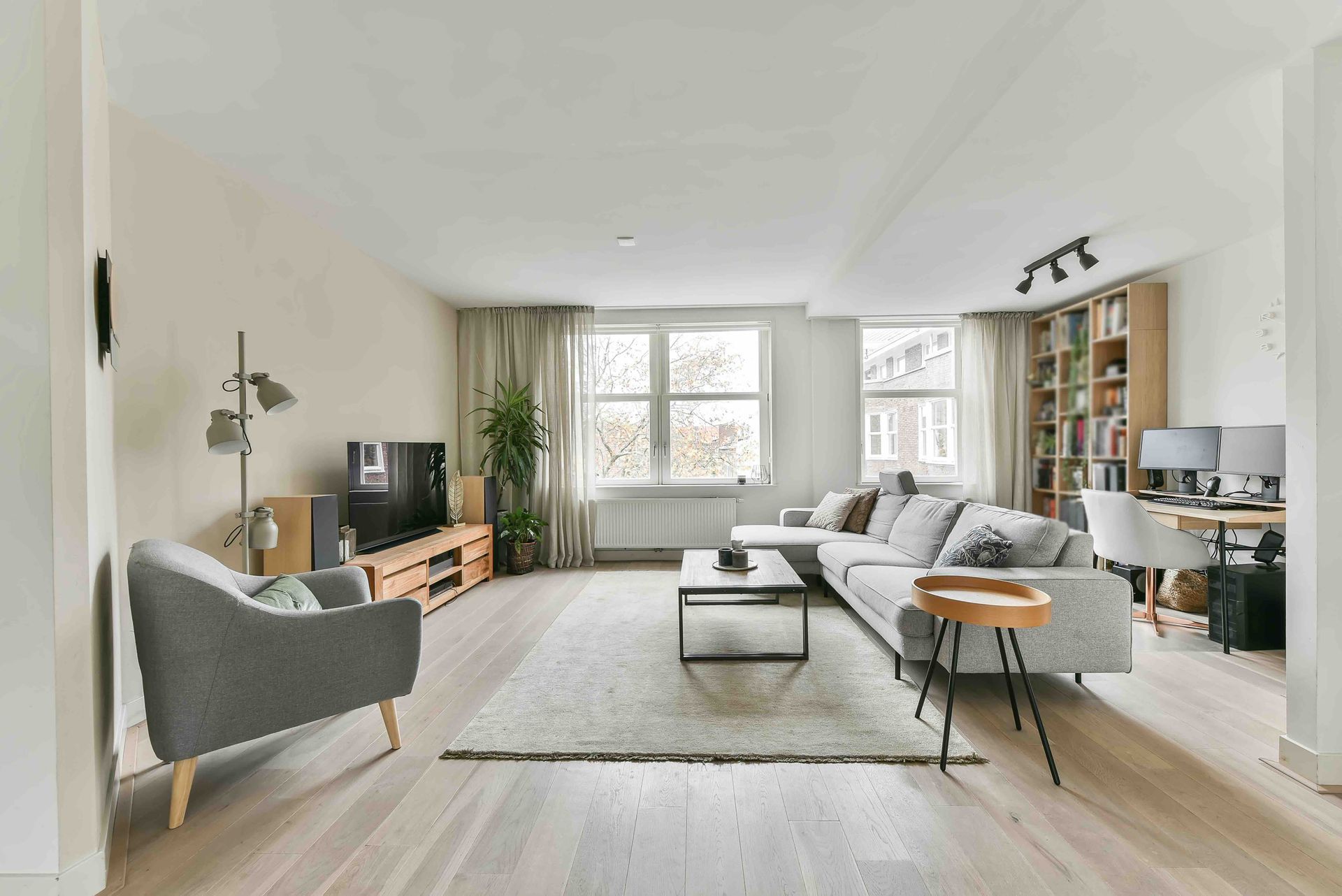327 W. Main Street, Suite 2, PO Box 65 Ionia, MI 48846
CALL US TODAY 616.522.6006
Decluttering 101: A Room-by-Room Guide
Are you tired of feeling overwhelmed by household clutter? Are you ready to create a calm, organized space that reflects your desired life? This comprehensive guide will show you how to declutter effectively and create a home that supports your well-being.
Don't underestimate the impact of clutter. It's not just an eyesore—it can drain your energy, erode your self-esteem, and lead to chronic stress. Research confirms that a cluttered environment hinders focus and increases anxiety.
Decluttering is more than just tidying up; it's an act of self-care. By letting go of what you don't need, you make room for what truly matters. Imagine the freedom of finding your coffee cup instantly in the morning and the surge of energy you'll feel as your home becomes a sanctuary.
Decluttering can also feel daunting, especially when letting go of sentimental items. But remember, the rewards are immense. Focusing on what truly adds value to your life today creates space for new experiences and a deeper connection to the present.
If your kitchen counters have vanished under piles of stuff, it's time for a decluttering intervention! Our in-depth guide will help you purge your home of unwanted items, create a sense of spaciousness, and simplify your life—all while reducing waste.
What is Clutter: Knowing the Core of Decluttering
To understand clutter, you need to define where it comes from. Clutter is anything we don't need, want, or use that steals our time, energy, and peace of mind. It can be outgrown clothes, outdated papers, broken toys, unwanted gifts, draining commitments, old grudges, or unfulfilling relationships.
We have stuff around our homes because we have yet to decide what to do with it, and we have clutter in our lives because we have yet to define our priorities. We may be organized in some areas but not in others. Objects may be scattered in plain sight or hidden in drawers and storage.
Our clutter has a life of its own, multiplying effortlessly. We may feel overwhelmed, controlled by our belongings, and stuck in a cycle of disorganization.
Identifying and understanding the types of clutter in your life will help you find the best ways to tackle them. By the end, you'll have a home that fills you with pride, bringing you peace and joy instead of exhaustion and stress.
Decluttering 101: Clearing the Kitchen
Kitchens are meant to be the heart of the home, but they often become clutter magnets! Bags, keys, and mail pile up; rarely-used gadgets occupy precious space. It's time to reclaim your kitchen. Remember the 12-month rule: If you last used it a year ago, consider letting it go.
Countertops
Clear away junk mail, old papers, and random clutter. Put pens and scissors in a designated spot, or move them to your home office. Stash appliances in cupboards whenever possible for a clean, open workspace. Give your fridge a makeover—ditch unnecessary magnets and papers, or at least arrange them neatly.
Food supplies
Don't just shove groceries anywhere! Organize your pantry with zones for baking supplies, spices, cereals, and more. Check those expiration dates and streamline leftover ingredients into labeled containers. Consider clear baskets for easy visibility.
Fridge
Tackle your fridge weekly, tossing expired food and leftovers. Once a month, please thoroughly clean it and create designated sections for dairy, meats, and other food items.
Food containers and storage
We all have that overflowing plastic container drawer. Match lids with containers and toss the rest. Store plastics together for quick access. Need more storage? Get creative! Hooks under cupboards and shelves can hang mugs, pots, and pans, freeing up valuable cabinet space.

Decluttering 101: Cleaning the Bathroom
Bathrooms always seem to be buzzing with activity, which can quickly become cluttered. To enjoy a peaceful bedroom, make a few small daily changes and invest in good storage. Keep clothes in check, give every item a home, and reclaim your space.
Cabinets
Start by cleaning out your cabinets. Toss old or nearly empty toiletries—you don't need six hand creams! Check medicine cabinets for expired medications and dispose of them safely, following FDA guidelines.
Towels
Got faded, worn-out towels? Donate them to your local animal shelter or repurpose them as cleaning rags. Next, check the expiration dates on makeup and personal care products. Using them beyond their prime can irritate your skin.
Personal products
Finally, if you have an abundance of shampoo or soap, consider donating the extras to shelters, churches, or neighbors who could use them immediately. Your decluttering becomes a way to help others.
Decluttering 101: Clearing the Office
A cluttered office drains productivity. To stay efficient, every team needs a system to keep things organized. While it's easy to become blind to the daily mess, don't let unnecessary items take over your workspace.
Refresh
Sometimes, the fastest way to declutter is to start fresh. Remove everything from your workspace and only add back the absolute essentials. This forces you to carefully consider what truly supports your work and eliminates unused items from taking up space.
Prioritize
Once you've got your core items, arrange them based on their frequency of use. Most used supplies go in top drawers or within easy reach, while less frequently used items can be stored farther away. Apply this same principle to the rest of your office space.
Organize
Be honest about what you truly need in your workspace. Even sentimental items can find a new home outside your office. Sort ruthlessly, recycling or throwing away anything you don't use or that's outdated.
Cleaning the Bedroom
A tidy bedroom isn't just about aesthetics—it's all about creating a calm, inviting space. This means daily upkeep and intelligent storage solutions. Commit to keeping clothes in check and giving every item, from jewelry to dirty laundry, to a designated place.
Create routine
Set aside 30 minutes each week to tackle your bedroom. Start with nightstands and dressers, clearing any trash or misplaced items. Place out-of-place belongings in a "catch-all" bin to sort later. Toss dirty clothes in the hamper and put clean laundry back where it belongs. Go through drawers, recycle what you don't need, and sort the rest.
Bedroom floor
A cluttered floor is a cluttered mind! Avoid tripping hazards by giving everything a designated spot. Hooks for clothes, a bookshelf for piled-up books, or a basket for shoes and toys can make a huge difference.
Creative storage
If space is tight, get creative! A bench with storage at the foot of your bed, a bedside chest, or under-bed boxes can provide extra space while seamlessly blending into your decor.

Decluttering 101: Clearing the Living Room
The living room: a hub of activity and a magnet for clutter! While keeping random items at bay is a constant battle, organizing the essentials makes a huge difference. A streamlined space means extra items stand out more, motivating you to deal with them.
Storage
Decluttering efforts can backfire if you end up with stacks of empty baskets. They just become invitations to fill them up again! Consolidate storage, ditch what you don't use, or relocate containers to areas where they'll be put to work.
Blankets and throw pillows
Faded, misshapen throw blankets and pillows drag down your living room's vibe. If they smell funky or aren't used often, toss them. Give tired pillows a refresh by washing them (with tennis balls in the dryer) or replacing the inserts if they've lost their shape.
Old gadgets
Old DVD players, outdated gadgets, and unused speakers occupy precious space. Trade bulky items for modern versions and recycle the rest. This frees up your entertainment center or shelves for items you enjoy.
Other living room items
Candles, vases, and decorative items add charm, but too many create visual chaos. If you can't find a spot for your coffee cup, it's time for a purge! Clear out unnecessary items—some might work in another room; others are better off donated.
Decluttering 101: Additional Tips
To make your home a haven, you need to declutter. By identifying what's just taking up space, you'll create room for the things you love.
Success starts with a plan
Before diving into decluttering, create a simple roadmap. Choose which room to tackle first and your goals for each space. This makes the process less overwhelming.
Slow and steady wins the race
Don't try to declutter your entire home in a day! Schedule short bursts of decluttering (15 minutes, one drawer, etc.) With breaks in between to prevent burnout. Focus on progress, not speed.
Tackling guilt and the 'sunk cost' fallacy
Feeling guilty when decluttering is normal, especially with gifts or sentimental items. Acknowledge the feeling, but remember—unused clutter can become a source of guilt. Donate or sell items to give them a new life or use the proceeds for something meaningful to ease the transition. Remember, you can't reclaim money already spent ('sunk cost'), so focus on how items improve your life now.
Quick wins for motivation
Need help figuring out where to begin? Start small for a sense of accomplishment! Clear off countertops, shelves, or other clutter hotspots. Store frequently used items within reach, donate rarely used ones, and organize the rest by category.
Don't let" someday projects" linger
Found a broken item? If you genuinely intend to fix it, do so immediately. Otherwise, it's cluttered. This frees up space and mental energy.
Categorize for clarity
As you declutter, group similar items together. This makes it easier to store them logically, based on where you'll use them (office supplies in the office, toys in the playroom, etc.).



Want to buy or sell property?
Call us today
Quick Links
Properties
Agents
Quick Links
Properties
Agents
Contact Info

327 W. Main Street, Suite 2, PO Box 65 Ionia, MI 48846

Monday-Sunday (By Appointment)
- Licensed REALTORS® & Real Estate BROKERS®
- Members of the National Association of REALTORS®
- Members of the Michigan Association of REALTORS®
- Members of the Greater Regional Alliance of REALTORS®
Riverside Realty is a Christian-based company that was born in 2017, when James Buxton and Aimee Knudson were introduced to each other through a mutual friend, as both were looking to make changes in their individual real estate careers.
website by SPECK DESIGNS


